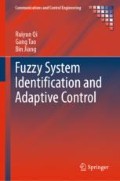Abstract
This chapter presents an overview of ideas and techniques of Takagi–Sugeno (T–S) fuzzy systems. In Chap. 1, we have introduced the basic concepts of fuzzy sets, fuzzy logic, and fuzzy inference mechanism. This chapter aims to present a necessarily selective review on T–S fuzzy systems including their architectures, important properties, and applicability in the field of nonlinear system identification and control with particular emphasis on the issues which are directly related to the main topics addressed in the following chapters.
Access this chapter
Tax calculation will be finalised at checkout
Purchases are for personal use only
References
Boyd S, El Ghaoui L, Feron E, Balakrishnan V (1994) Linear matrix inequalities in systems and control theory. SIAM, PA, Philadelphia
Bronshtein IN, Semendyayev KA (1985) Handbook of mathematics. Van Nostrand Reinhold, New York
Buckley JJ (1993) Sugeno type controllers are universal controllers. Fuzzy Sets Syst 53:299–303
Cao SG, Rees NW, Feng G (1995) Analysis and design of fuzzy control systems using dynamic fuzzy global models. Fuzzy Sets Syst 75:47–62
Cao SG, Rees NW, Feng G (1997a) Analysis and design for a class of complex control systems - Part I: fuzzy modeling and identification. Automatica 33:1017–1028
Castro JL (1995) Fuzzy logic controllers are universal approximators. IEEE Trans Syst Man Cybern 25:629–635
Castro JL, Delgado M (1996) Fuzzy systems with defuzzification are universal approximators. IEEE Trans Syst Man Cybern 26:149–152
Chadli M, Maquin D, Ragot J (2000) Relaxed stability conditions for Takagi–Sugeno fuzzy systems. In: Proceedings of IEEE international conference on systems, man, and cybernetics, Nashville, TN, pp 3514–3519
Chou J-H, Chen S-H (2001) Stability analysis of the discrete Takagi–Sugeno fuzzy model with time-varying consequent uncertainties. Fuzzy Sets Syst 118:271–279
Feng G (2004) Stability analysis of discrete-time fuzzy dynamic systems based on piecewise Lyapunov functions. IEEE Trans Fuzzy Syst 12(1):22–28
Feng G (2010) Analysis and synthesis of fuzzy control systems: a model-based approach. CRC Press, Boca Raton
Gahinet P, Nemirovski A, Laub AJ, Chilali M (1995) LMI control toolbox for use with Matlab. The Mathworks, MA, Natick
Isidori A (1995) Nonlinear control systems, 3rd edn. Springer-Verlag, London
Jin Y (2003) Advanced fuzzy systems design and applications. Physica-Verlag, Heidelberg
Joh J, Chen YH, Langari R (1998) On the stability issues of linear Takagi-Sugeno fuzzy models. IEEE Trans Fuzzy Syst 6:402–410
Johansson M, Rantzer A, Årzé K-E (1999) Piecewise quadratic stability of fuzzy systems. IEEE Trans Fuzzy Syst 7(6):713–722
Khalil HK (2002) Nonlinear systems. Prentice-Hall, Upper Saddle River
Kim E, Kim D (2001) Stability analysis and synthesis for an affine fuzzy system via LMI and ILMI: discrete case. IEEE Trans Syst Man Cybern 31:132–140
Krstić M, Kanellakopoulos I, Kokotović P (1995) Nonlinear and adaptive control design. Wiley, New York
Lilly JH (2010) Fuzzy control and identification. Wiley, Hoboken
Li N, Li SY (2004) Stability analysis and design of T-S fuzzy control system with simplified linear rule consequent. IEEE Trans Syst Man Cybern 34:788–795
Marino R, Tome P (1995) Nonlinear control design: geometric, adaptive and robust. Prentice-Hall, Englewood Cliffs
Nijmeijer H, Van der Schaft A (1990) Nonlinear dynamical control systems. Spring-Verlag, New York
Passino KM, Yurkovich S (1998) Fuzzy control. Addison Wesley Longman Inc., Reading
Rovatti R (1998) Fuzzy piecewise multilinear and piecewise linear systems as universal approximators in Sobolev norms. IEEE Trans Fuzzy Syst 6:235–249
Tanaka K, Sano M (1994) A robust stabilization problem of fuzzy control systems and its application to backing up control of a truck-trailer. IEEE Trans Fuzzy Syst 2(2):119–134
Tanaka K, Sugeno M (1992) Stability analysis and design of fuzzy control systems. Fuzzy Sets Syst 45:135–156
Tanaka K, Ikeda T, Wang HO (1998) Fuzzy regulators and fuzzy observers: relaxed stability conditions and LMI-based designs. IEEE Trans Fuzzy Syst 6(2):250–265
Wang L-X (1994) Adaptive fuzzy systems and control-design and stability analysis. Prentice-Hall, Englewood Cliffs
Wang L-X (1998) Universal approximation by hierarchical fuzzy systems. Fuzzy Sets Syst 93:223–230
Wang LX, Mendel JM (1992) Fuzzy basis functions, universal approximation, and orthogonal least-square learning. IEEE Trans Neural Netw 3:807–814
Wang HO, Tanaka K, Griffin MF (1996) An approach to fuzzy control of nonlinear systems: stability and design issues. IEEE Trans Fuzzy Syst 4:14–23
Ying H (1994) Sufficient conditions on general fuzzy systems as function approximators. Automatica 30:521–C525
Ying H (1998a) General SISO Takagi–Sugeno fuzzy systems with linear rule consequent are universal approximators. IEEE Trans Fuzzy Syst 28:582–587
Ying H (1998b) Sufficient conditions on uniform approximation of multivariate functions by general Takagi–Sugeno fuzzy systems with linear rule consequent. IEEE Trans Syst Man Cybern 28:515–520
Zeng XJ, Singh MG (1994) Approximation theory of fuzzy systems - SISO case. IEEE Trans Fuzzy Syst 2:162–176
Zeng XJ, Singh MG (1995) Approximation theory of fuzzy systems - MIMO case. IEEE Trans Fuzzy Syst 3(2):219–235
Zhang YJ, Tao G, Chen M (2017) Parametrization and adaptive control of multivariable non-canonical T–S fuzzy systems. IEEE Trans Fuzzy Syst 25(1):156–171
Zhou SS, Feng G, Lam J, Xu SY (2005) Robust H-infinity control for discrete fuzzy systems via basis-dependent Lyapunov functions. Inf Sci 174(3–4):197–217
Author information
Authors and Affiliations
Rights and permissions
Copyright information
© 2019 Springer Nature Switzerland AG
About this chapter
Cite this chapter
Qi, R., Tao, G., Jiang, B. (2019). T–S Fuzzy Systems. In: Fuzzy System Identification and Adaptive Control. Communications and Control Engineering. Springer, Cham. https://doi.org/10.1007/978-3-030-19882-4_2
Download citation
DOI: https://doi.org/10.1007/978-3-030-19882-4_2
Published:
Publisher Name: Springer, Cham
Print ISBN: 978-3-030-19881-7
Online ISBN: 978-3-030-19882-4
eBook Packages: Intelligent Technologies and RoboticsIntelligent Technologies and Robotics (R0)

